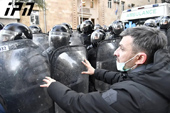
Riot police disperses rally, bureau meeting held in parliament without opposition
By Natalia Kochiashvili
Tuesday, November 19
The Ministry of Internal Affairs of Georgia (MIA) used water cannon to disperse the rally in front of parliament in Tbilisi after demonstrators refused to leave the territory and allow MPs in the legislative body. Protesters, including opposition leaders, tried to resist riot police and sat down in the street to block their movement. Following a brief confrontation, police used water cannons and removed protesters from the street. Barricades were also removed from the scene.
Reportedly, police used tear gas against protesters as well. Additional units of riot police, deployed near the Opera Theater, moved from Rustaveli Avenue to the Parliament building. Riot police approached the Parliament building from all sides and protesters unsuccessfully tried to stop them.
Police also removed the tents placed on the road outside the Parliament building, using water cannon. While the street in front of the Parliament was cleared, the sidewalk and stage used by protest leaders to address the supporters remained intact, cordoned off by ordinary policemen. Riot police forced demonstrators, who were occupying the street, to move to Freedom Square.
The protesters were removed from all the entrances of the parliament building. Several people were injured during the rally outside the parliament after the riot police started to disperse the rally using the water cannon.
Leaders of the Movement 'It's a Shame', Giga Makarashvili and Zuka Berdzenishvili, as well as Zura Japaridze, leader of the political party "Girchi", have been arrested outside the Parliament during the dispersal of the protest rally.
The MIA has reported that 37 individuals have been detained during the dispersal of the rally for hooliganism and disobedience to police, violating Article 173 of the Code of Administrative Offenses and Article 166.
Earlier yesterday, Interior Ministry called on the leaders of political parties and organizers of the rally “to stop blocking the Parliament building,” otherwise, police would react adequately in frames of their mandate. The ruling party representatives also called on law enforcement agencies earlier to take lawful actions.
Later on, Police gave demonstrators 30 minutes to allow MPs in, as the protesters have blocked all entrances of the legislative body since Sunday, protesting the rejection of the ruling Georgian Dream party proposed election bill on the move to a fully proportional electoral system. Demonstrators refused to leave the area within the “reasonable time” given by law enforcement agency.
Protest rally of civic activists and opposition parties in downtown Tbilisi, demanding fully proportional snap elections have been ongoing since Thursday after parliament’s failure to pass promised electoral law.
After 2 parallel rallies held by united opposition and civic activists in front of parliament and Alliance of Patriots at the freedom square on Sunday, dozens of activists and opposition supporters remained around Georgian parliament overnight, keeping blocked its 3 entrances and preventing GD MPs from entering the legislative body, calling them “slaves”.
According to the Chairman of the Parliament Archil Talakvadze, the Ministry of Internal Affairs, with the full compliance of the law with the police, was able to restore the conditions necessary for the activities of the Parliament and to return to the rally within the law. According to him, the goal of the representatives of the opposition was to block state functions.
“This means the function block, which is linked to public policy, budget, pensions transfer our citizens, social allowances, current and future projects of infrastructure development, which is directly related to the main functions carried out by our state and the daily subsistence our citizens. That is why these activities, the goal and the task that the opposition set out are beyond the scope of peaceful demonstrations,” said Archil Talakvadze.
In addition, Talakvadze called on the opposition to discuss the issues in a parliamentary debate format.
“Today we have seen the government close the dialogue window,” said the leader of the building movement, Davit Usupashvili. He said there is a big problem as the authorities refuse dialogue.



